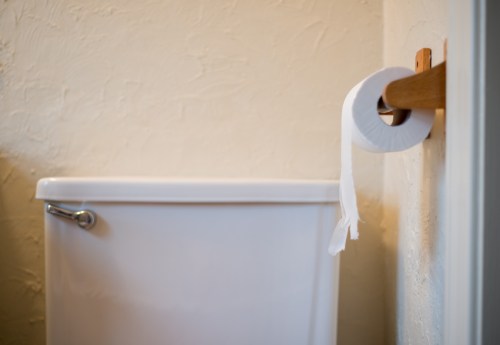Backed Up? Here’s Exactly How Long Experts Recommend Sitting on the Toilet To Poop for Optimal Pelvic Floor and GI Health
When you're constipated in can be tempting to sit on the toilet for as long as it takes, however here's when you should call it quits.

I think we can all agree that going number two without any roadblocks, traffic jams, or emergencies is the most ideal experience—and yet sometimes, we just aren’t so lucky. When things are on the slower side of the spectrum, and it just doesn’t feel like you’re getting anywhere (so to speak), experts like pelvic floor therapist Heather Jeffcoat DPT, the founder of Femina PT in Los Angeles, strongly recommend that you avoid sitting on the toilet for longer than five minutes at a time.
Experts in This Article
doctor of physical therapy, owner of Femina Physical Therapy, and author of Sex Without Pain
For those who love to sit on the toilet and read their Dr. Bronner’s shampoo bottle, New Yorker magazine, or partake in a solid Candy Crush session, this may come as bad news to you. Sure, it can be frustrating to experience constipation, and waiting it out might seem like the best idea. However, according to experts, it’s actually not that great for you for a few reasons. To learn about why this is and what to do instead, Dr. Jeffcoat breaks it down further.
Why should you only sit on the toilet for five minutes or less
“Just sitting on a toilet for long periods of time compresses nerves in the perineum, and can lead to temporary numbness,” says Dr. Jeffcoat. “This should resolve within seconds to minutes of standing. This numbness, however, is not as much of a concern as straining is.” Straining is that sensation of trying to “push” or force a bowel movement to happen. And if you have ever been constipated, it can feel like the only thing left to do. Unfortunately, according to Dr. Jeffcoat, straining can put your pelvic floor in an unfavorable position that can lead to longer-term issues down the road.
“Straining weakens your pelvic floor muscles and can lead to the development of hemorrhoids or, in severe cases, pelvic organ prolapse,” says Dr. Jeffcoat. Straining can also cause anal fissures, which are small tears in the mucosa lining of the anorectal canal and opening. These can be painful, and signs of them include pain after a bowel movement or bright red blood when you wipe after going number two.
So, why is five minutes the benchmark? According to Dr. Jeffcoat, it’s roughly the span of time that separates sitting from straining. “Typically, if a bowel movement is going to happen, it should happen without straining, pushing, or waiting for longer than five minutes,” she says.
If you’re having a hard time going, though, there are a few ways you can support your system and keep things moving.
How to encourage a bowel movement without sitting for a long time
1. Use a toilet stool
Dr. Jeffcoat recommends that when you find yourself sitting on the toilet and things just don’t seem to be moving on a consistent (or even inconsistent) basis, your best bet is enlisting help from a toilet stool. “By elevating your knees above your hips, you improve the anorectal angle, improving the ability for your bowel movement to pass,” she says. “If you don’t have a toilet stool or are traveling, you can flip a small trash can upside down and put your feet on that instead.”
2. Go for a walk
Walking around can support your digestive system’s movement and help encourage a bowel movement. This is especially true after eating a meal or hydrating.
3. Staying on top of water and fiber consumption
Getting backed up is not abnormal, and there are plenty of ways to fight it outside of sitting on the toilet forever. Staying on top of drinking water around the clock is a great way to support your digestive system and regular poops as well. This is because fiber and water can add moisture and lubrication to your stool—and the digestive tract it needs to move through.
All in all, if you’re feeling backed up, you can take the five minute mark as your signal to get off the pot and try again later. You can get some water, go for a walk, or nosh on something with soluble or insoluble fiber. Getting out of the bathroom can also alleviate the emotional distress that can sometimes come from being constipated as well. Remember that things should start moving along with at-home tools or over-the-counter medicine—and, if not, making a call to a healthcare provider is always a good idea.










